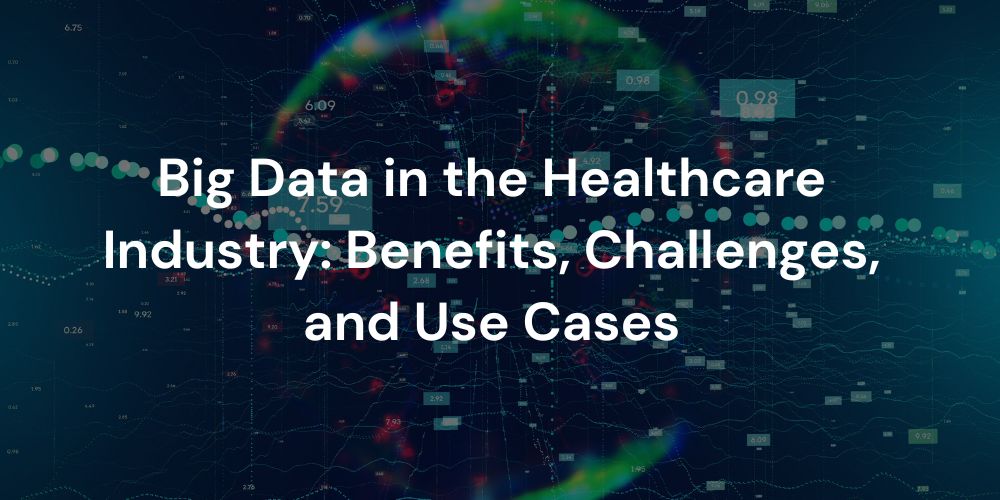Big Data in Healthcare Industry: Benefits, Challenges, and Use Cases


The healthcare sector inherently thrives on innovation, given that the global well-being and lives of individuals hinge on the effective integration of cutting-edge technologies within medical facilities. Among the transformative forces transcending multiple industries, Big Data has redefined the collection, utilization, and retention of information, with healthcare being no exception. The incorporation of Big Data in healthcare unveils unprecedented prospects for enhancing the quality of patient care, forecasting treatment outcomes, delineating patterns in public health, and beyond.
Moreover, Big Data introduces novel avenues to optimize operational costs within clinics and bolster data security through a spectrum of storage alternatives, including on-premise, cloud-based, and hybrid solutions. Nevertheless, the adoption of new technologies comes with its own set of limitations. Today, we will look at the benefits of Big Data, the challenges that stop more clinics from adopting it, and the most common use cases that prove its utility.
What is Big Data in Healthcare?
Big Data in healthcare can be described as a reservoir of information characterized by its substantial volume, extensive variety, and rapid velocity, demanding resourceful and pioneering data processing techniques to extract valuable insights. In the process of digitizing patient health records, the healthcare sector generates an ever-expanding pool of data that conventional database software tools struggle to handle. This is precisely where the concept of Big Data steps in, offering notably more efficient avenues for information processing.
Within the healthcare landscape, patient health records represent just one among numerous founts of data. Various stakeholders contribute to the data stream: users of telemedicine applications, governmental bodies and regulatory entities, researchers, patient portals, and more. This multifaceted participation leads to an exponential surge in data processing demands, a challenge that can only be effectively met through the apt integration of Big Data methodologies.
With the progressive digitization of the healthcare sector, it becomes increasingly apparent that a continuous surge in data generation is inevitable. Projections indicate that the global healthcare Big Data market is poised to attain a value of $81.3 billion by 2030, growing at an impressive compound annual growth rate of 18.2%. Research institutions and medical centers across the world contribute substantial volumes of unstructured clinical data on a daily basis. This escalating influx of data underscores the imperative of further intensifying the adoption of Big Data solutions within the healthcare domain.
The Benefits of Healthcare Data Analytics
The significance of Big Data extends beyond mere information processing; it plays a pivotal role in extracting invaluable insights and facilitating informed decisions through the realms of healthcare data analytics and predictive medicine. Nevertheless, these advantages merely scratch the surface of the benefits that Big Data imparts within clinical settings.
Enhanced Patient Care
At the core of any medical institution lies the mandate to provide optimal patient care, foster well-being, and preclude exacerbation of health conditions. This pivotal objective is intricately intertwined with understanding patient condition trends, delving into their medical histories, and executing precise interventions to address their medical concerns. Healthcare data analytics empowers medical practitioners to scrutinize the multifaceted contributors to a patient’s condition. This illumination not only reveals potential risks but also unveils avenues for interventions that can mitigate those risks, ultimately resulting in favorable health outcomes.
Moreover, data can be harnessed to educate patients, equipping them with knowledge and motivation to preemptively manage potential complications. Acquired insights can seamlessly be integrated into telehealth applications, thereby granting users access to personalized health recommendations and information, all from the convenience of their smartphones. This transformative approach not only democratizes healthcare accessibility but also eases the burden on medical facilities, especially during critical periods like the ongoing pandemic.
Optimizing Costs
Clinics frequently grapple with financial inefficiencies arising from inadequate resource and finance management, a predicament often exacerbated by staff overbooking or underbooking. Predictive analytics provides an avenue for clinics to allocate human resources and design shifts with precision, leading to enhanced efficiency.
This approach enables clinics to optimize their staff distribution, bolstering coverage during high-demand periods while reducing staff during lulls in clinical services. Leveraging data analytics tools facilitates the identification of workload distribution patterns over specific timeframes, culminating in the judicious allocation of clinical staff.
Minimizing Human Error
Errors in prescriptions and treatments have long plagued healthcare institutions, with significant repercussions. In the United States alone, preventable medication errors incur costs of up to $20.6 billion, impacting approximately 7 million patients and causing around 7,000 preventable deaths annually, as reported by the Pharmacy Times. Healthcare data analytics serves as a guardian against erroneous prescriptions, meticulously analyzing patient health records and cross-referencing them with prescribed treatments. This proactive approach potentially flags errors that might precipitate undesirable or fatal outcomes.
Enhanced Security
Healthcare data analytics plays a pivotal role in decoding health records and resource data, serving as a sentinel against security breaches and preemptively mitigating threats. These analytical tools assist in identifying anomalies in system functionality, aberrations in traffic patterns, suspicious login activities, and more. Given the criticality of cybersecurity within the realm of Big Data applications for healthcare and beyond, a heightened emphasis on data security becomes imperative.
The transition of an increasing volume of patient data into the digital sphere underscores the heightened significance of data security within healthcare. To address this, a multitude of international and local regulations, such as HIPAA compliance, define the yardsticks for the lawful usage and protection of clinical data. If engaged in the development of a telehealth application or any software interfacing with patient data, adherence to HIPAA standards or other pertinent regulations becomes not just advisable, but essential, based on your operational geography.

The Challenges When Adoption of Big Data in Healthcare
Obstacles abound in the widespread integration of Big Data within the healthcare domain, and comprehending these barriers can illuminate pathways to surmount them.
Financial Implications
The financial outlay for adopting Big Data in healthcare continues to pose a formidable challenge for clinics both domestically and globally. Healthcare institutions must secure resources for procuring the requisite technology, hardware, and software tools necessary for efficient data management. Additionally, they must either acquire existing Big Data applications for healthcare or commission the development of tailored applications to suit their needs.
The creation of healthcare applications demands substantial investment, often exceeding hundreds of thousands of dollars, contingent upon the application’s intricacies and specifications. Another expenditure pertains to the remuneration of data scientists, with the costs varying based on factors such as recruitment location and methodology.
While this investment is non-trivial, it remains indispensable. To harness the potential of Big Data applications within a healthcare organization, committing to this financial venture is imperative. Collaborating with a Big Data application development partner who aligns with budgetary considerations can help mitigate the impact of the initial investment cost.
Data Aggregation and Cleaning
Healthcare data originates from diverse sources, encompassing patient health records and clinical staff remuneration records. Synthesizing this array of data necessitates seamless cooperation among disparate stakeholders. Moreover, the inherently unstructured and heterogeneous nature of Big Data mandates classification and aggregation strategies to render the data amenable to subsequent analysis.
Curating the aggregated data involves a crucial step of cleansing to uphold accuracy and consistency. This process can be automated or manual, with the former preferable for managing voluminous datasets. Real-time handling of new data compounds the challenge. Each piece of data requires cleansing and processing before integration into storage to preempt potential corruption or degradation, preserving its utility for subsequent analytics and insights.
Management Issues
The integration of healthcare data analytics is relatively new for the industry, necessitating a cultural shift within clinics. Embracing Big Data entails engaging with novel experts and training existing staff to wield the new tools adeptly. For certain clinics, this transformation mandates a complete overhaul of existing IT infrastructures, restructuring of personnel allocations, and the adoption of novel operational protocols. This restructuring can lead to stress and discontent among clinic personnel, yet these changes are imperative for organizational advancement.
Interoperability
This challenge is relevant for healthcare entities engaged in collaboration with external third parties. Several clinics persist in employing traditional pen-and-paper approaches for health records. Consequently, the transition to digitized data management might not be uniform across all healthcare establishments. A scenario where patient records are stored on paper at another clinic while another embraces innovative data analytics and predictive medicine tools poses obstacles to accessing and utilizing patient data seamlessly.
This issue is anticipated to endure for years, especially within underdeveloped communities where technology adoption takes time. Thus, technological disparities will continue to inhibit the broader implementation of Big Data in healthcare, albeit on a smaller level.
Read more: Overcoming Challenges of Data Integration in Healthcare

Use Case of Big Data in the Healthcare
With the merits of Big Data in healthcare established, let’s delve into its real-world applications within clinical settings. Here, we present seven ways to harness the potential of Big Data in your clinic, knowing that the avenues for its utility extend far beyond this list.
Diagnostics: Streamlined and Precise
Healthcare data analytics and Big Data expedite accurate disease diagnostics. In complex cases, physicians conventionally correlate patient symptoms with known disease histories or reference well-known medical cases. Alternatively, they might delve into medical literature, consult colleagues, and integrate symptoms into their knowledge framework.
Big Data applications for healthcare elevate this process. Physicians input patient data into algorithms, generating a list of potential diagnoses and recommended tests for further precision. The app accelerates diagnostic efficiency and efficacy.
Forecasting and Modeling: Illuminating the Future
Beyond present analyses, Big Data empowers predictive medicine. Predictive models extract insights from existing conditions, anticipating disease outcomes and treatment responses. Some models forecast disease progression based on patient habits, clinical records, familial health trends, and other factors. For instance, predictive models have effectively identified latent diabetes in symptomatic patients.
Monitoring Public Health: Uncovering Trends
Data analytics tracks public health trends, analyzing patient cohorts with shared health patterns to predict individual risks. Similar symptom patterns inform the typical progression of diverse diseases, offering foundations for clinical research and actionable treatment protocols.
Telehealth Applications: Data-Driven Care
Telehealth applications hinge on Big Data, churning vast volumes of high-velocity information. Given their dual usage by physicians and patients, meticulous data management becomes paramount for functional efficiency. While embarking on telehealth software development, grappling with the sheer data influx is imperative.
Preventive Care: Averting Ailments
Big Data applications in healthcare spearhead preventive care, potentially saving lives. Predictive medicine identifies early disease indicators, enabling physicians to initiate preemptive measures against adverse outcomes. This early intervention mechanism functions as a lifeline, warding off health threats before they materialize.
Electronic Health Records (EHR): Insights from Histories
Electronic health records (EHRs) rank as pivotal healthcare data sources, with global clinics adopting or crafting EHR platforms. Big Data scrutinizes and interprets patient medical histories accessed through EHRs. This comprehensive view underpins accurate care administration, enabling physicians to fathom potential ailment triggers and sidestepping treatment errors.
Hospital Resource Planning: Efficiency Through Analysis
Predictive analytics can be seamlessly woven into enterprise resource planning (ERP) systems. Discerning efficient resource utilization versus waste transforms clinic cost-effectiveness. Even minor medical supplies, like cotton pads or syringes, can erode budgets if mismanaged. Astute resource scheduling and timely resupply management could yield substantial annual savings for clinics.
Final Thoughts: Harnessing Big Data with a Trusted Partner
The integration of Big Data is progressively permeating healthcare establishments across the global landscape, although it stands on the cusp of universal implementation. The potential to optimize costs, fortify decision-making, curtail human errors, enhance security, and, crucially, elevate the caliber and efficacy of patient care underscores the transformative power of Big Data and data analytics.
Amidst these undeniable advantages, the successful adoption of Big Data presents challenges for numerous healthcare organizations. Predominant hindrances encompass technical intricacies and the associated adoption costs. However, these challenges can be effectively navigated with the support of a dependable technical partner. At Bestarion, we stand poised to aid partners in surmounting the primary obstacles linked to Big Data adoption within the healthcare sector. Our amalgamation of technological expertise, domain proficiency, seamless collaboration, and unwavering dedication to superior patient care can pave the way for rapid and budget-conscious adoption of Big Data solutions.
